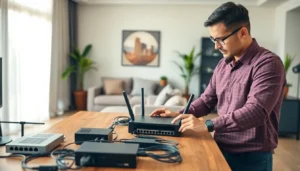Table of Contents
ToggleIn today’s digital age, online privacy and security have become paramount concerns for many households. With increasing threats from cyberattacks and data breaches, more people are turning to Virtual Private Networks (VPNs) to protect their online activities. VPNs not only safeguard personal information but also provide a way to access geo-restricted content, making them a valuable tool for everyday internet users.
As remote work and streaming services continue to rise, understanding the benefits and functionalities of VPNs for home usage is essential. From enhancing security on public Wi-Fi to enabling seamless access to global content libraries, VPNs offer a range of advantages that cater to the modern user’s needs. Exploring how these tools can transform home internet usage is crucial for anyone looking to enhance their online experience.
Overview of VPN Home Usage
VPN usage at home provides numerous advantages that enhance online security and privacy. Users connect to the internet through an encrypted tunnel, which safeguards data from potential hackers, especially when using public networks. VPNs mask IP addresses, making online activities anonymous and protecting personal information from tracking.
Several scenarios illustrate the practical benefits of VPNs in home settings.
- Remote Work: Employees access corporate networks securely. VPNs encrypt sensitive information, ensuring secure communication between remote workers and office servers.
- Streaming Services: Users bypass geo-restrictions. VPNs allow access to content libraries from different regions, enabling access to additional streaming options.
- Public Wi-Fi Security: Individuals connect safely to public Wi-Fi. VPNs add a layer of protection, mitigating risks associated with unsecured networks.
- Bypassing Censorship: Citizens access restricted websites. VPNs circumvent local limitations, providing freedom to browse without restrictions.
- Enhanced Privacy: Users maintain online anonymity. VPNs prevent ISPs and third parties from monitoring internet activity, contributing to stronger privacy safeguards.
With the rise of online threats and privacy concerns, adopting a VPN for home usage becomes essential for secure internet navigation.
Benefits of Using a VPN at Home

Using a VPN at home offers significant advantages, particularly in terms of online privacy and access to content. Below are key benefits that illustrate the importance of incorporating a VPN into a home network.
Enhanced Online Privacy
Enhanced online privacy manifests through encryption technologies that VPNs provide, safeguarding data from unauthorized access. VPNs create a secure tunnel for internet connections, ensuring sensitive information remains confidential. VPNs also mask IP addresses, making it difficult for third parties to track online activity. By using a VPN, individuals protect personal information from cyber threats, enabling safer online interactions.
Bypassing Geo-Restrictions
Bypassing geo-restrictions remains a compelling benefit of VPN usage. VPNs allow users to connect to servers in different countries, granting access to region-specific content on streaming services. This capability enables viewing popular shows or movies that might not be available locally. With a VPN, individuals can enjoy a broader range of entertainment options and avoid frustrating content restrictions frequently imposed by service providers.
Choosing the Right VPN for Home Use
Selecting an appropriate VPN for home use involves evaluating several critical aspects. Understanding these features ensures optimal protection and enhanced online experiences.
Important Features to Consider
- Security Protocols: Look for strong security protocols like OpenVPN and IKEv2 that provide effective encryption and authentication.
- Logging Policy: Choose providers that enforce a strict no-logs policy to ensure user activity remains confidential and untracked.
- Speed and Performance: Evaluate connection speeds offered by the VPN. High-speed connections enhance streaming and browsing experiences.
- Server Locations: Opt for VPNs with a diverse range of server locations to access various geo-restricted content effectively.
- Device Compatibility: Confirm compatibility with multiple devices and operating systems, ensuring comprehensive coverage for all internet-enabled devices at home.
- Customer Support: Reliable customer support, including live chat and email assistance, proves essential for resolving issues quickly.
- Pricing Plans: Compare pricing plans to find value in terms of features, such as monthly vs. annual subscriptions, and check for money-back guarantees.
Top VPN Providers for Home Users
| VPN Provider | Key Features | Price Range |
|---|---|---|
| ExpressVPN | Fast speeds, extensive server locations, strong security | $8.32/month (annual) |
| NordVPN | Strong encryption, double VPN feature, user-friendly interface | $3.71/month (annual) |
| CyberGhost | User-friendly apps, dedicated streaming servers, no-logs policy | $2.75/month (annual) |
| Surfshark | Unlimited device connections, ad-blocker, strong privacy features | $2.49/month (annual) |
| Private Internet Access | Customizable security features, large server network | $2.03/month (annual) |
Selecting any of these top providers enhances online security, access to worldwide content, and overall user experience for home internet use.
Setting Up a VPN at Home
Setting up a VPN at home enhances online security and privacy. The process is straightforward, involving a few essential steps to ensure optimal configuration.
Step-by-Step Installation Guide
- Choose a VPN Provider: Pick a reputable VPN provider based on security features, speed, and user reviews.
- Create an Account: Register for an account on the provider’s website and select a subscription plan that fits usage needs.
- Download the VPN App: Download the app compatible with the device, such as Windows, macOS, Android, or iOS.
- Install the VPN App: Install the application following the on-screen instructions provided during the download process.
- Log In to the App: Open the app and log in using the account credentials created during registration.
- Select a Server: Choose a server location from the list. Selecting servers closer to home usually offers better speeds.
- Connect to the VPN: Click the connect button to establish a secure connection to the chosen server.
- Adjust Settings (Optional): Configure additional settings like protocol selection, kill switch, or auto-connect options based on personal preferences.
- Test the Connection: Verify the VPN connection by checking the IP address through an IP check website to ensure it reflects the server location.
Common Troubleshooting Tips
- Check Internet Connection: Verify the device has a stable internet connection before troubleshooting the VPN.
- Restart the Device: Restart the device to refresh the system and resolve minor connection issues.
- Update the VPN App: Ensure the VPN app is updated to the latest version for optimal performance and security fixes.
- Reconnect to the VPN: Disconnect and then reconnect to the VPN to reset the connection.
- Change Server Location: Select a different server if there are connectivity issues, as some servers may experience high traffic.
- Check Firewall Settings: Review firewall settings, as they might block the VPN connection. Adjust settings to allow VPN traffic.
- Contact Customer Support: Reach out to customer support for assistance with persistent issues or configuration problems. They provide tailored help and solutions.
Security Considerations for VPN Home Usage
VPN home usage introduces critical security considerations. Users must understand potential vulnerabilities and choose a VPN that addresses them effectively.
- Data Encryption
Data encryption protects sensitive information during transmission. Look for VPNs using robust protocols like OpenVPN or IKEv2, as they provide strong encryption standards.
- No-Log Policies
No-log policies ensure that the VPN provider doesn’t keep records of user activities. A transparent privacy policy helps build trust and indicates a commitment to user privacy.
- Kill Switch Feature
A kill switch automatically disconnects the internet if the VPN connection drops. This feature prevents data leaks and maintains privacy, ensuring users remain protected even during network interruptions.
- Malware Protection
Some VPNs offer built-in malware protection. This feature blocks harmful websites and helps safeguard devices against malicious software, enhancing overall security.
- Multi-Device Support
Multi-device support allows users to secure multiple devices under one subscription. This feature is essential for families or individuals using various gadgets for internet access.
- Secure DNS
Secure DNS prevents DNS leaks, which can expose browsing habits. A VPN with its own DNS service helps maintain privacy by routing DNS queries securely.
- Multi-Factor Authentication
Multi-factor authentication adds an extra layer of security by requiring additional verification during login. This measure enhances account protection against unauthorized access.
- Regular Updates
Regular software updates patch vulnerabilities and enhance overall security. Ensure the chosen VPN provider actively maintains its software to address emerging threats.
- Transparency Reports
Many reputable VPN providers publish transparency reports detailing government requests and data handling practices. These reports promote accountability and provide insights into the service’s reliability.
- User Reviews and Reputation
Checking user reviews and the provider’s reputation in the cybersecurity community can offer valuable insights. Recommendations from trusted sources often highlight effective VPNs that focus on security.
These considerations guide users in selecting a VPN that effectively enhances security in a home setting, protecting data integrity and privacy.
Adopting a VPN for home usage is no longer just a luxury but a necessity in today’s digital landscape. It offers essential protection against online threats while enhancing privacy and security. With the right VPN, users can enjoy unrestricted access to global content and maintain anonymity online.
Choosing a reliable provider with strong security features ensures users can navigate the internet safely. By understanding the functionalities and benefits of VPNs, individuals can make informed choices that significantly improve their online experience. Embracing these technologies not only safeguards personal information but also empowers users to explore the internet without limitations.




